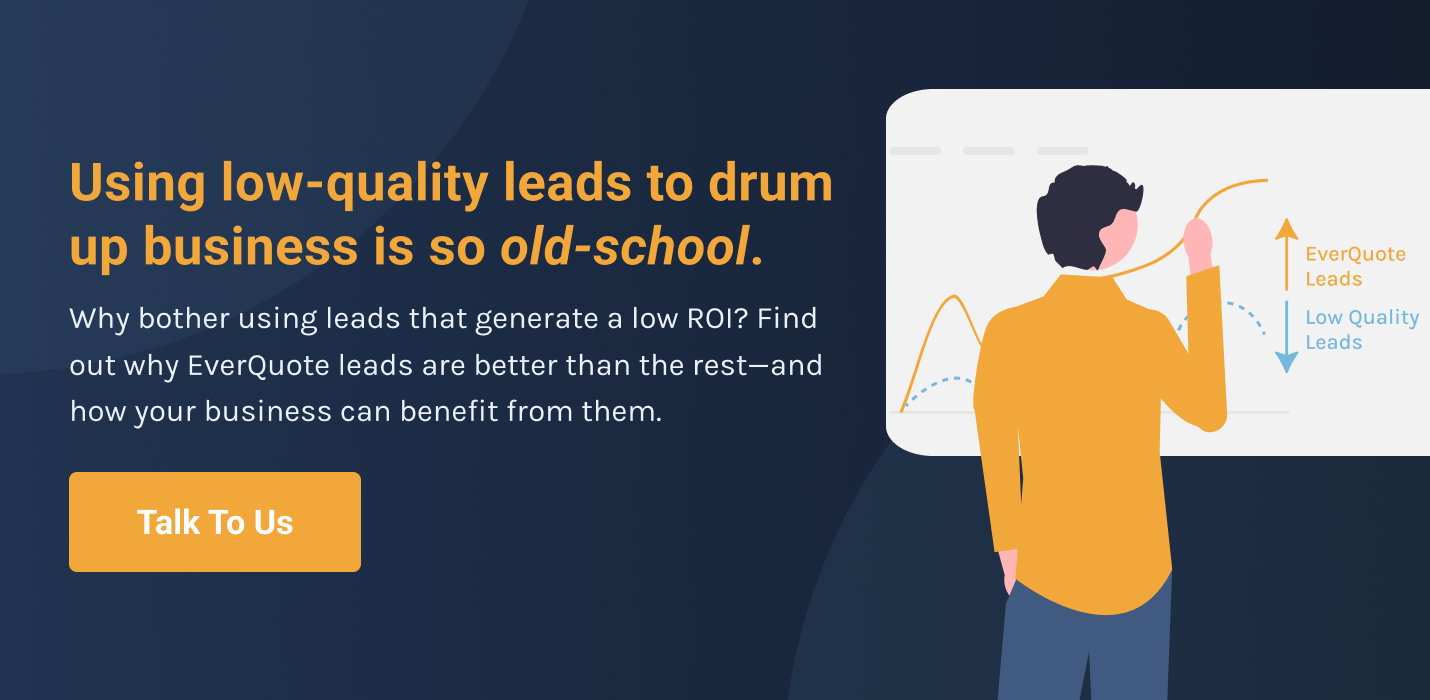- Home»
- EverQuote Pro Blog»
- How Do Online Insurance Leads Compare To Other Methods?
How Do Online Insurance Leads Compare To Other Methods?

How do online insurance leads compare to other methods of generating leads for your agency? In this article, we’ll look at the differences in seven types of insurance leads, how those leads are generated, and consider the pros and cons of each.
Under The Microscope: 7 Types Of Insurance Leads
1. Warm Online Insurance Leads
A “warm” online insurance lead is when a prospect is searching for various terms via a search engine (“car insurance quote,” etc.), which then connects with a website. They then fill out a questionnaire related to insurance and consent to sharing the information with an insurance agent who can then deliver the prospect a quote.
Benefits:
- “Warm” online leads have a high close rate of around 10%.
- They help insurance agents trying to build their agencies by helping keep their pipelines consistently filled.
- Warm leads have actually expressed intent to buy insurance, so it’s more likely agents will have a chance to talk to them, and potentially close a sale.
- With Warm leads, if you know your KPIs and monitor your important data (what you’re spending, your return on investment, etc.), you can make it much easier to track your success. They are also scalable, so you can add more as your agency grows!
Partners like EverQuote do this online insurance generation for you. We connect local prospects who are actually looking for insurance to agents like you.
Considerations:
- Warm online insurance leads cost more than other types of leads. But even though some agents experience an initial sticker shock, upon closer inspection they realize these leads are an investment that yields high returns. And when you partner with EverQuote to purchase your leads, you’ll get more than just leads—we help all our partner agents identify how to optimize their leads and tweak their processes if there seems to be an issue.
2. Cold Online Insurance Leads
The biggest difference between warm and cold online insurance lead generation is that cold leads did not request a quote (and likely do not intend to purchase insurance). (Tweet this!) Cold leads are generated through web scrapes of people living in certain areas. This information is collected through things like internet pop-up surveys, raffles, Facebook games, etc. This is basically the online version of going through phone numbers in a phone book.
Benefits:
- Cold leads are not as expensive as warm leads.
- They may be helpful if you have time to make a high volume of cold calls or to comb through numbers in a specific area.
Considerations:
- Cold leads did not request a lead and likely do not intend to purchase insurance.
- Close rates are near 1%.
- These leads cost you time and dedication for little to no return.
- When contacting cold leads, agents must be cognizant of federal and state laws that address emailing, calling and texting of consumers for marketing purposes (ie. laws prohibiting the use of auto-dialers, ensuring opt-out or do not call requests are honored, etc.)
3. Referrals & Cross Selling
Cross selling means maximizing your book of business by trying to sell additional products to your existing customers. For example, if you sell an auto policy to a customer, you might call them again six months later to see if they want to bundle it with a different type of policy. It helps agents retain business because it’s harder for customers to cancel many policies vs. just one.
Benefits:
- Cross-selling and referrals help agents retain customers. Referrals are an easy close, and the small cost involved in acquiring these leads makes them an incredible value. Residuals are how agents make money. If 90% of your book retains business with you, that delivers huge ROI.
Considerations:
- There are no real cons to cross-selling and referrals—in fact, if it were possible, we’d recommend employing these two lead-generation methods to almost any insurance agent looking to build their business.
4. Mortgage Leads
Insurance agents and mortgage lenders can partner to share customer names. For example, a mortgage lender might provide contact information to an agent about a person buying a home.
Benefits:
- These are the quality consumers all agents want, because they have been vetted by the partner (in our example here, the mortgage lender).
- They generally have no cost to agents because the referral relationship is reciprocal.
Considerations:
- The number of this type of lead is often very limited.
5. Traditional Advertising
Generating leads through traditional advertising types—direct mail, billboards, etc.—involves blanketing specific areas with your contact information in hopes people will take notice and respond.
Benefits:
- Traditional advertising efforts may be trackable. Direct mail is easy to track because you know who you’ve sent mail to; billboards, on the other hand, are not trackable unless you spend extra money to use a tracking phone number or website unique to each billboard you place (or someone tells you they saw you on a billboard).
Considerations:
- You may or may not be able to track all these methods to determine ROI; or, tracking will incur an extra cost.
- These methods are limited by geography and expense. For example, the cost of a billboard is generally proportional to how many people will see them in a given area.
6. Your Agency Website
All agents should be working to increase the visibility of their website using keywords online. Agents should have, at a minimum, a basic website for their agency with the products that they offer and contact information. Many people purchasing insurance have trouble bridging the trust and legitimacy gap unless they see their agent’s website, so this method is well worth the effort.
Benefits
- You can use your website, your social media platforms, and organic search terms in tandem to bring high-quality leads in the door.
- It’s inexpensive. Many (if not most) agents are provided a free website through their carrier; it’s relatively easy and inexpensive to optimize it and use it to your advantage. Social media sites are also free to use.
- You can customize your website to allow visitors to submit their information for a quote. This provides an easy way to get contact information online very quickly.
Considerations:
- You may dedicate a lot of resources to this method and still not end up ranking highly in search engines, so few prospects may be able to find you online.
- You have to keep your website up with regular maintenance.
7. Search Engine Optimization (SEO) Strategy
With this option, you generate your own leads in-house via the internet and your background knowledge of search engines. Your goal here is to create content that search engines like Google will pick up; the higher quality you create, the better chance you have to show up on the first few pages of sites like Google.
Benefits:
- When you generate leads yourself, you know exactly where your leads are coming from and can speak to their validity.
- You gain visibility locally and on a larger scale.
Considerations:
- This method of lead generation can be very expensive. Unless you have a lot of money or a very large insurance business, in most cases you will get only a limited number of leads.
- This method requires a substantial time investment—you’ll either need to hire someone to do SEO or do it yourself, which will take time away from more valuable tasks. Because the operating and labor costs of using SEO tools are very high, we don’t recommend this option as a core strategy for most agents.
Which type of insurance lead should you choose?
There’s no one-size-fits-all answer. To find out what works best for you, you’ll have to do the following:
- Evaluate your business type. Do you have an existing book of business you can sell to? If so, cross-selling and referrals may be a great first step. In fact, we suggest that every agent work with their existing network, because it’s the cheapest way to get leads that will last you at least a month or two. However don’t plan to rely solely on referrals!
- Evaluate your local market. How saturated is it? If there’s potential to grow locally, you may want to invest in local advertising—but be sure you do this in a way that’s trackable or you may be wasting your investment.
- Evaluate your willingness to grow your agency. Are you looking to grow your business beyond your local market? If so, then an online insurance lead generator like EverQuote is a great option because it can give you the numbers you need outside of your local market to potentially bind more policies.
See how online lead generation can benefit you—contact us today to get started!
With EverQuote, you have complete control over how many leads you receive each day, and can customize your parameters and even pause your account with no consequences. Click here to get a tour of the software with one of our experts.
Unlock predictable growth with EverQuote.
Our representatives are standing by to help you succeed.
Call 844-707-8800
Weekdays, 9AM-5PM (ET)
Call 844-707-8800
Weekdays, 9AM-5PM (ET)
Accelerate your growth.
Complete the form below or just call 844-707-8800 to learn how we can help you achieve your goals.
By clicking "Get Started", I consent by electronic signature to being contacted by EverQuote, including by automatic telephone dialing and/or an artificial or prerecorded voice (including SMS and MMS - charges may apply), regarding EverQuote for Agents, even if my phone number is listed on a Do Not Call Registry. I also understand that my agreement to be contacted is not a condition of purchasing any goods or services, and that I may call (844) 707-8800 to speak with someone about EverQuote for Agents.
By clicking "Get Started", I affirm that I have read and agree to this website’s Privacy Policy and Terms of Use, including the arbitration provision and the E-SIGN Consent.
* Mandatory fields
 Product Overview
Product Overview Blog
Blog FAQs
FAQs Webinars
Webinars eBooks & Resources
eBooks & Resources